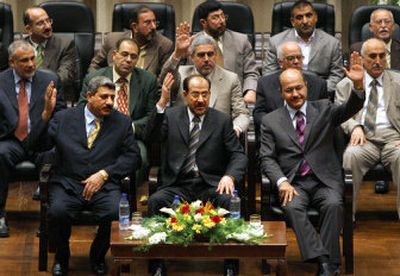Iraqis approve new government

BAGHDAD, Iraq – Iraq’s battling communities came together Saturday to approve their first full-term government since the fall of Saddam Hussein, placing a nation fractured from three years of war into the hands of a diverse but weak Cabinet.
In a stuffy chamber tucked deep inside rings of blast walls, barbed wire and bomb-sniffing dogs, parliament voted in favor of a 35-member Cabinet cobbled together by new Prime Minister Nouri al-Maliki. In the heart of the Green Zone, far from the reach of ordinary Iraqis, lawmakers raised their hands to vet each member of the mostly male government.
Although it was marked by a walkout by a handful of angry Sunni lawmakers, the inauguration shattered the deadlock that had paralyzed Iraqi governance since December.
“I stand solemnly before the souls of our martyrs and the precious blood offered by Iraqis, and seek inspiration from our people’s steadfastness, sacrifices and pains, the imprisonment, torture, killing and terrorism they’ve faced,” al-Maliki told parliament. “Just as we did away with the tyrant (Saddam Hussein) and the days of oppression and despotism, we will do away with terrorism and sabotage.”
But al-Maliki, a Shiite Muslim whose political acumen is tinged with a deep-seated Islamism, faces a perilous obstacle course. He has a Cabinet so wide-ranging it’s prone to collapse, a 34-point program that runs the impossible gamut of Iraq’s wish list – and a disillusioned, weary nation to govern.
The new prime minister has yet to quell a swelling crisis over management of Iraq’s security services. In the end, staring down a Monday deadline to appoint a Cabinet, al-Maliki delayed decisions on the key posts of interior, defense and national security. To buy time and push the government through parliament, he nominated temporary fill-ins – himself and his two deputies.
“This government won’t be a panacea for solving all problems, but it’s a beginning,” said Hoshyar Zebari, the Kurdish foreign minister. “We wanted to present the whole Cabinet; it would have been better.”
Safe streets and restored peace are the overwhelming desires of the Iraqi people, and the looming priorities for any government that hopes to win public confidence. Not only have the security ministries been struggling in the face of daily killings, but some of the police units have been accused of roving the streets as Shiite death squads.
Violence continued to rage outside the Green Zone on Saturday as the gears of government ground on. At least 20 people were killed in a homemade bomb blast in Sadr City, the predominantly Shiite slum in Baghdad. Fifteen corpses turned up in the capital, all with wrists bound and signs of torture, an Interior Ministry source said. In Yousefiya, insurgents planted explosives on an oil pipeline, setting off a massive blaze.
The steady carnage poses a challenge to the Bush administration, too: Untainted, effective security services are essential to U.S. hopes of fading gradually from Iraq’s streets by reducing troops and patrols.
On the surface, the Cabinet of Shiites, Sunnis and Kurds unveiled Saturday is just the body to appease a torn nation. Urbanites keen for a secular state sit alongside pious Iraqis in search of Islamic rule; advocates of loose federalism vie against leaders demanding a strong central government.
But analysts point out that a government made up of squabbling factions forced together by political expedience as well as Western pressure is doomed to inherent weakness. Wary of giving too much power to any one interest, the Iraqi system is a deliberately hamstrung affair, they say.
In the so-called “national unity government,” every faction is represented, and therefore every interest must be sated. That means each policy decision is a potential pitfall for a prime minister constitutionally hemmed in by a president as well as a Cabinet that must approve major decisions on security issues with a two-thirds majority.
The battle for the security ministries, which will continue to rage this coming week, will likely be fierce. Al-Maliki has pledged to find ministers who are not overly loyal to their sects or political parties.